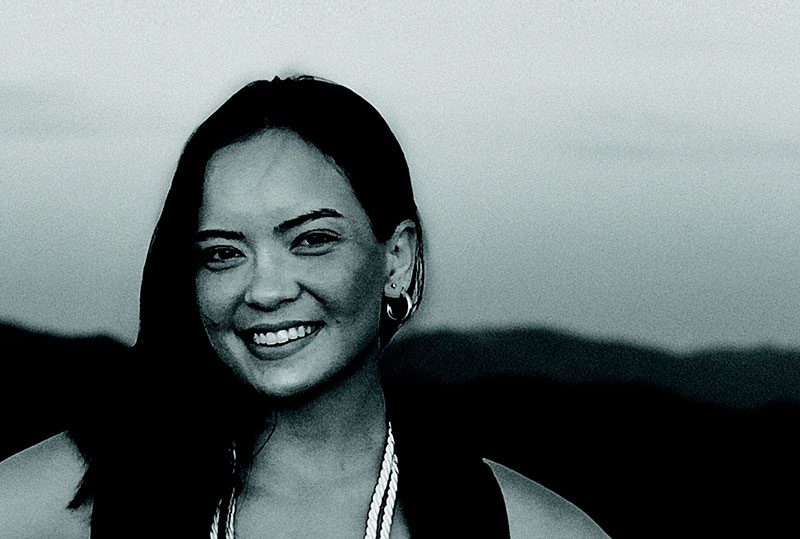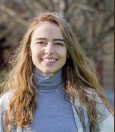
What seems like a dead end can
turn out to be the absolute right path.
Just be open to possibilities.
Mahal Miles flunked every economics test she took at North Medford High School.
But just a few years later, she graduated from Oregon State University with a degree in managerial economics, a minor in public health management and a certificate in medical humanities.
Economics wasn’t the plan when Mahal enrolled at OSU. She was going to study public health. But a couple of introductory classes in economics opened her eyes to different possibilities. In those first classes, she “realized the power of economics and how it’s very much the backbone to policy,” Mahal says. “The combination of econ and public health is a great lens for advocating for human capital investment.”
With encouragement from economics faculty, Mahal forged ahead — and brought others along. Through the Women in Economics Club, she helped develop a mentoring program to support marginalized students in economics.
Associate Professor Liz Schroeder calls Mahal “a true leader on campus. She studied academic research on mentoring, used best practices learned through other mentoring work at OSU and drew on her own personal experiences,” Schroeder says. “She’s leaving behind a legacy that makes our program better, and her work on making economics more inclusive helps improve the entire field as well.”
For Mahal, the deeper she got into the field, the more she understood economics as the backbone to policy. “It offers a very systemic way of thinking and a very methodical approach to policy analysis,” she says.
Although her original college plans shifted, Mahal has continued to combine economics, public health and social justice. Shortly after graduating, Mahal joined the Center for Vulnerable Populations at the University of California San Francisco as a policy analyst focused on digital health literacy and equitable outcomes.
She’s come a long way from that high school classroom. On a journey that began at Oregon State, Mahal Miles will be making a difference for a long time.
Mahal Miles,
’21College of Liberal Arts
Honors College
It’s OK to be different. It can actually be great.
Ever since he was young, being unique was what Joshua Flores has strived for. So when presented with a major in the sciences that most don’t follow, he was all for it. And in the long run, Joshua wants to use his degree in bioresource research to help cut the world’s use of fossil fuels.
Joshua didn’t waste any time working toward his goals. In his first year at Oregon State, he applied to the STEM Leaders program, which opened up opportunities for research, an internship and mentoring.
“What may be my future started my freshman year in a lab at OSU,” Joshua says. “I am forever grateful for the STEM Leaders program for helping me gain such an experience.”
It was his first time in a lab, and Joshua got to work with some cutting-edge technologies, including the gene-editing tool CRISPR, short for clustered regularly interspaced short palindromic repeat. Even mistakes felt more like learning experiences. And it was the connection he made with his mentor, which allowed him to ask as many questions as he could, that proved the most valuable.
“He made sure to foster my curiosity with answers that not only satisfied my requests but went further and challenged my thinking,” Joshua says. ”Thinking was the best way to get an experience that fully encompassed what it meant to work in a research laboratory.”
A first-generation college student, Joshua often feels surprised at how much he grew in that first year. “I learned how to fend for myself, accept myself and come out of my shell,” he says.
One lesson he wants to pass along to incoming students is to learn how to use campus resources early in their first year.
“From the writing center to the career development center, the staff is not only qualified, they are more than happy to help,” he says. “To succeed, you will need help, and to get help, you will need to seek it out. A world of opportunity opened up to me when I started utilizing the resources.”
Joshua continues to forge his own path and tells others not to be afraid to be unique and different.
“Differences are not inherently bad,” he says. “You learn from the differences you have with others, and others learn from the differences they have with you. investigate your unique interests, ask questions, learn, build and grow.”
It can make all the difference.

Joshua Flores
College of Agricultural Sciences
With opportunities in engineering and medicine, she pursued both.
Helena Raposo, ’21, says her main goal in choosing to study engineering was to improve people’s lives. During her time at Oregon State, she found research opened multiple paths to achieve that goal.
Helena’s first research experience was during the summer of her second year, at Oregon Health & Science University. She studied neural stem cells, specifically how hyaluronic acid impacts the growth and development of these cells in the presence of neurodegenerative diseases like Alzheimer’s.
“It was definitely a learning curve because it was my first time working in a lab,” Helena says. “But understanding it was very important for me. I think anyone who knows someone with a disease like this would be more curious to learn about it and try to find a way to solve it.”
Helena found another opportunity in Associate Professor Bo Sun’s biophysics lab. There, she ran experiments with a collagen matrix that mimics the setting of a tumor surrounded by healthy cells. The experiments allowed Helena and other researchers to study the mobility and behavior of cancer cells.
Helena also joined the College of Engineering Leadership Academy, representing Oregon State at the National Academy of Engineering’s Grand Challenges Scholars Program. At the 2019 GCSP global summit in London, she collaborated with students from universities around the world.
“In research, and really in anything you do, getting different perspectives is crucial, because you never know who is going to come up with the best idea,” Helena says. “Being open-minded is so important to meeting your goals.”
Helena has already met one of hers, earning a degree in bioengineering. Now she’s preparing for her next step: applying to programs where she can earn both a medical degree and a Ph.D. During her summer at OHSU, she talked with some M.D.-Ph.D. students. She likes how the dual-degree program focuses on both patient care and research.
“I got to hear about what they do and the research they work on,” she says. “So, that was, like, bam! I want to do this too.”
Helena sees engineering and medicine as two sides of the same coin. “For me, it’s really thinking about how I can understand problems to better solve them,” she says. “If you do research, you’re trying to understand the root of the problem. In medicine, you’re trying to get to the root of the disease.”
As she continues her education, there’s no doubt Helena Raposo will get to the root of both.

Helena Raposo, ’21
College of Engineering26
